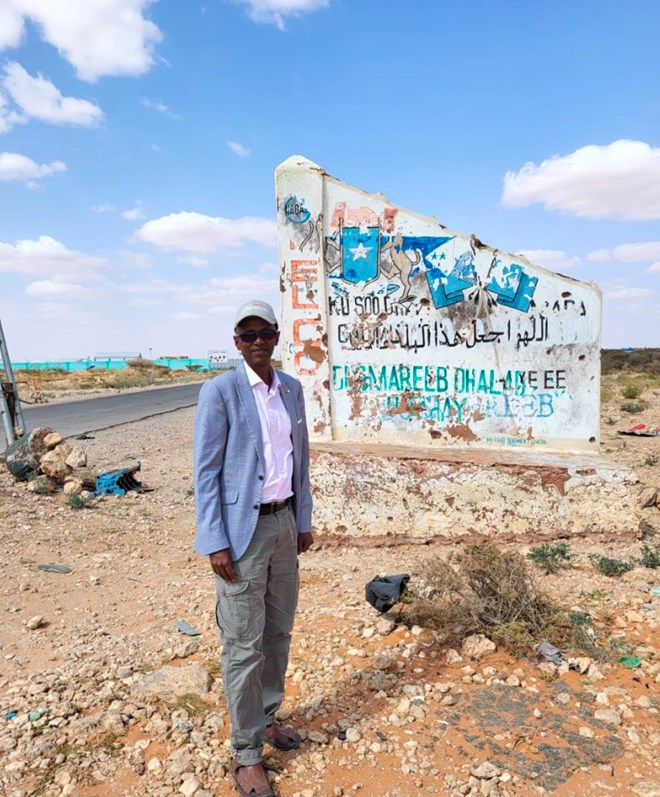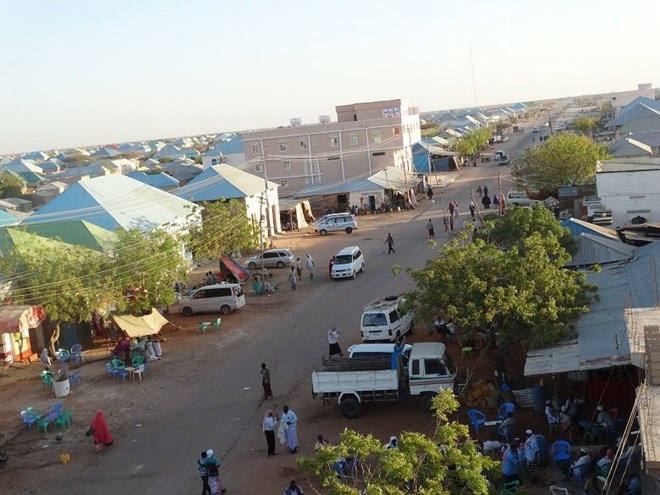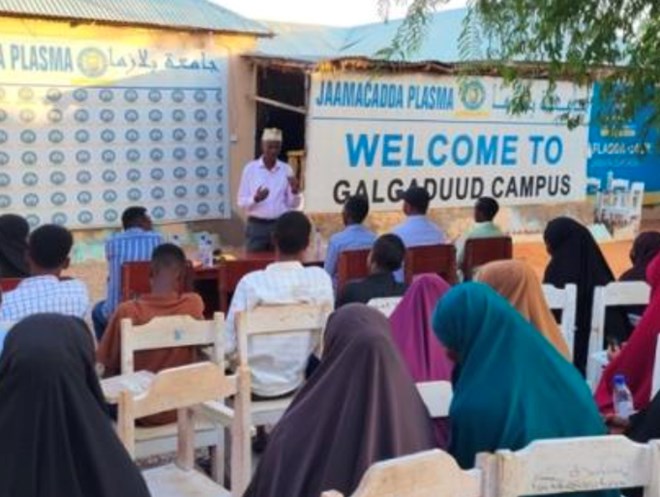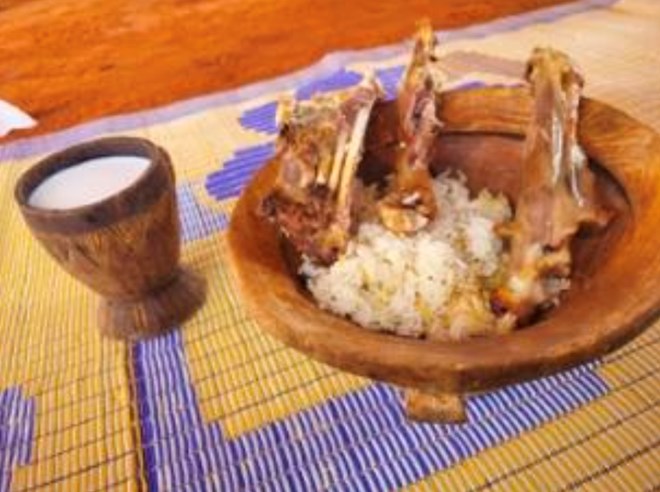Dr Yusuf Sheikh Omar
September 18, 2023
Dr Yusuf Sheikh Omar is standing at the entry gate to Dhusamareb is inscripted with a quote from the Quran that reads “O My Lord, make this a peaceful land, and provide its people with fruits”
On September 4th 2023, we ventured to Dhusamareb, the capital city of Galmudug State of Somalia. We had a mixture of mood; a sense of a peace mission blended with trepidation for our security. The city has recently converted to an epicentre of military operations. The President of the Federal Republic of Somalia HSM is stationed there to navigate garrisons waging an offensive against al- Shabaab.
The city is located in an arid, flat land. If you look on the horizon, your sight will return to you exhausted and weary. On our way from the airport to the city, I observed very skinny camels and bony sheep due to the drought and dry season. Somalis link war to drought and peace to prosperity as the saying goes (col iyo abaar, nabad iyo caano). The city is bustling and booming. The richest people in Somalia hail from Galmudug State. Despite the dry reason, we were surprised with delicious meat and camel milk available in every hotel and most households.

My team consisted of a well-dedicated peace crew from Interpeace and the Heritage Institute for Policy Studies (HIPS), which is involved in a joint programme named Talo Wadaag (TW). The meaning of TW is “a constructive dialogue”. Our first peace mission commenced with an informal meeting with the Second Deputy of Galmudug Parliament Hon. Fadumo Abdi Ali dubbed Fadumo Faandhe. “It was good kick-off with a decision-maker woman like her in a patriarchal society” I whispered into the ears of my colleagues. We were amazed to listen to the hardship she had gone through to reach this position—one that many powerful men failed to achieve. Again, we met her formally a second time in the Parliament House of Galmudug. The aura was obvious. She elaborated her multi-faceted experiences in conflict resolution including her attempts to reconcile grieving women affected by clan warfare in Galmudug. “When there is a clan fight, only the elder men from external clans are dispatched to reconcile their male counterparts from clans engaged in fighting. Women who bear the most pain are forgotten in their grievances” she said leaning back to her chair. “I am glad to see two young women in your peace mission” she continued pointing her finger to them. A similar comment was voiced by Hon Ubah Dhiblawe, Minister of Women, Human Rights and Child Development of Galmudug State who we also met her twice while in in the city. Ubah explained the daunting challenges facing women be it rape or denial of their basic rights in governance and politics. Both Ubah and Fadumo were very helpful to our mission.
“Local women should be empowered to seek their political rights. You know, most top females in decision-maker positions in Somalia are diasporic. They have been exposed to freedom of expression, gender equality and how to demand their rights, which is missing here. Political representation is not given voluntarily but demanded” said Abdullahi Ibrahim Abdi who is a director and an expert in local governance and state-building of Galmudug and beyond. Women’s circumstances have, unintentionally, dominated our peace journey. TW Programme’s focus is to empower citizens particularly women, youth and marginalized groups to get involved in governance, state and peacebuilding processes in the conflict-affected Somali society. Now, the past explains the present. Professor Axmed Salad Kulmiye from the Horn-Centre joined the chorus of women’s involvement in restoring peace. He said “In the past, women used to be successful Ergo (peace mediators)”. “This is reflected by the Somali catchphrase: ‘Ergo dumar waa ashahaadadii u danbaysay’... the intended meaning of this poetic metaphoric phrase is: Women’s mediation is the final resolute” he argued. “Recently, there have also been cases in which traditional elder men failed but women succeeded” he recounted. “In 2013, women from Saleebaan tribe from Cadaado city extinguished vendetta war between Saleebaan and Cayr subclans” he explained. “Often, women’s intervention comes when traditional clan elders like ugaasyada, boqorada, malaaqyada etc. fail to stop bloodshed” he expressed forcefully.
Besides the women’s role, Prof Axmed underlined the importance of ‘Suugaanta’ (arts) and particularly gabay (poetry) in peacebuilding or perpetuating violence. As an example, the Prof recited poetry urging peace and another one instigating violence. When hearing the term ‘suugaan’ and gabay, the entire TW team did experience a tingle of excitement. In fact, Somalis are described as a nation of poets. A distant memory surfaced in my mind. A documentary, based on Somalis’ most inspirational and popular peace conference in Carta (Arta), Djibouti 2000, demonstrated how poetry, songs, storytelling and women’s efforts rescued, several times, the Carta conference from an imminent collapse. “I undressed myself in front of the audience to force belligerent elder men harbouring clan-based animosity and mistrust to come together and reconcile. And I succeeded” said a prominent singer, Fadumo Nakruma in the documentary. “suugaantu such as poetry, traditional dancing, concerts etc. were the most effective awareness and educational programmes that reconciled tribesmen, healed their inner world, promoted social harmony and made Carta conference triumphant” stated an elder man in the documentary who participated in Carta conference.

Let’s come back to the Dusamareb women’s story. They use neither niqaab (face covering) nor bleaching for skin lightening. Unlike other main cities in Somalia, Dhusamareb women preserved their beautiful golden colour Allah bestowed them. They are in peace with their natural hue. When asked why? A middle aged man responded “they have been influenced by Ahlu Sunna wal-Jama'ah’s interpretation of Islam. So, they are loyal to their Islamic school of thought”.
On the next day, we took a tour to a new, yet, under construction, multi- purpose premise named Guriga Nabadda “Peace House” funded by EU but managed jointly by Galmudug Center for Research and Dialogue (GRD) and IRIS. GRD is an emerging, influential think tank. No doubt the premises will play a major role in entrenching peace culture in Galmudug. On our last day in Dhusamareb, the GRD team took us 15km away from the city and we were served with cad iyo caano (meat & milk). It reminisced me of the old days and reconnected me to my childhood life style when I was a nomadic boy. Life then was peaceful and prosperous.

Other important institutions we engaged in while in Dhusamareb included Galmudug’s Ministry of Education. There is no doubt that a well-designed educational curriculum can be the key for nurturing peace as Unesco stated in 1945 “since wars begin in the minds of men, it is in the minds of men that the defences of peace must be constructed through education”.
On our second day in Dhusamareb, I offered a public forum “learning culture & social change” for Plasma University. Students had requested more forums on critical
thinking, creativity, conflict resolution and civic education. Their curiosity and enthusiasm captured my attention. The term ‘Jaamacad’ (University) has a sacred meaning in the Somali mindset and so, peace can easily be proliferated in the universities. The impact of my workshops ‘Seeds of Peace’ for tertiary students since 2015 have imprinted hope in their psyches.
In our social engagements held in Dhusamareb, the ongoing stabilization in the Galmudug areas recently recovered from al-Shabaab (AS) has been a prominent theme that you can hardly miss in any discussion. Aspects highlighted, included a pre-recovery phase of activities, such as the first contact to citizens lived under AS’s rule for the last 10-15 years, building rapport, early assessment of their basic needs such livelihoods, social services water, food, health, education, urgent establishment of local governance, rule of law, and justice by empowering local mechanisms of conflict resolution, reconciliation, long term trauma healing, community outreach and so on.
In conclusion, all indicators show that peace is taking a foothold in Dhusamareb. Interpeace and HIPS team is dedicated to being part of the peace process in Galmudug State.
Dr Yusuf Sheikh Omar is the Director, Talo Wadaag 2 Programme, Heritage Institute for Policy Studies (HIPS)